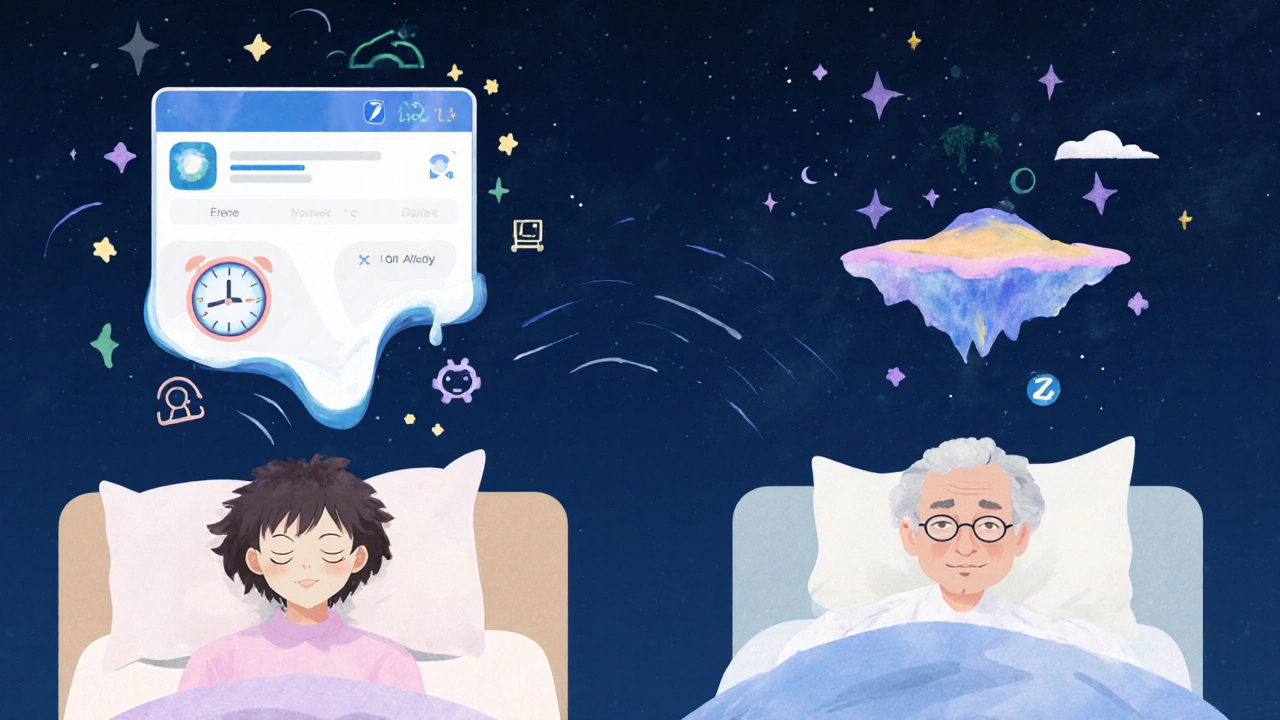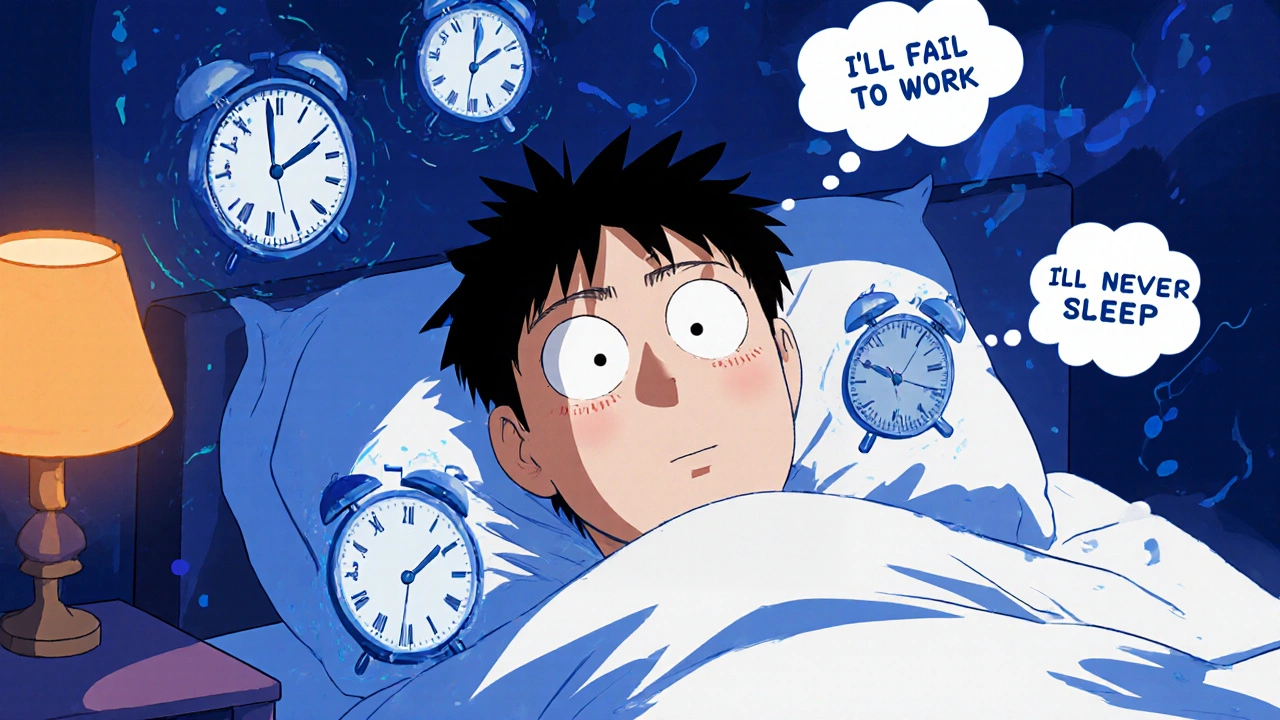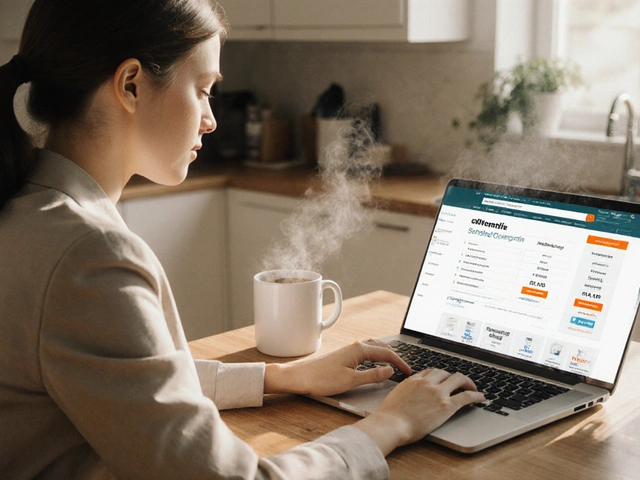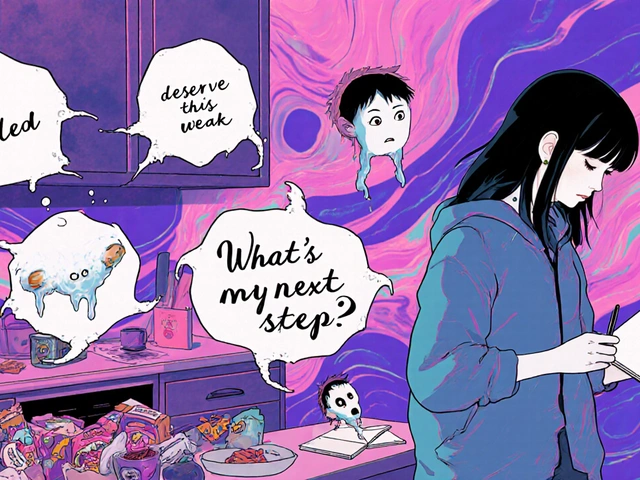If you’ve been lying awake for hours, watching the clock tick past midnight, you’re not alone. Over 30% of adults in the U.S. and U.K. struggle with chronic insomnia - not just occasional trouble sleeping, but nights of tossing and turning that last for months or even years. And most people reach for a pill. But what if the best solution isn’t something you swallow, but something you learn?
Why Sleep Medications Feel Like a Quick Fix - But Aren’t
Sleep medications like zolpidem (Ambien) work fast. You take one, and within an hour, you’re out. It’s tempting. Especially when you’re exhausted, frustrated, and your brain won’t shut off. But here’s the catch: the relief doesn’t last.Studies show that within eight weeks, about 42% of people using zolpidem develop tolerance. That means the same dose stops working, so you need more. And more pills mean more side effects: dizziness, memory lapses, next-day grogginess, even increased fall risk in older adults. The FDA flagged these risks in a 2021 safety update. Worse, once you stop, insomnia often comes back - sometimes worse than before.
Medications treat the symptom - not the cause. They don’t fix the mental habits that keep insomnia going. Like worrying you’ll fail at work if you don’t sleep eight hours. Or checking the clock every 10 minutes. Or staying in bed for hours, just waiting for sleep to come. These behaviors become automatic. And pills don’t rewire them.
Cognitive Behavioral Therapy for Insomnia (CBT-I): The Real Solution
Enter CBT-I - Cognitive Behavioral Therapy for Insomnia. It’s not a new fad. It’s been around since the 1980s. And since 2016, the American College of Physicians has said it should be the first-line treatment for chronic insomnia - ahead of any medication.CBT-I isn’t about positive thinking or meditation alone. It’s a structured, science-backed program with five core parts, delivered over 6 to 8 weekly sessions. Each one is designed to break the cycle of insomnia by changing how you think about sleep and how you act around it.
The Five Pillars of CBT-I - And How They Work
- Sleep Restriction Therapy (SRT): You spend less time in bed. If you’re only sleeping 5 hours a night, you’re told to limit your time in bed to 5 hours - no more. Sounds cruel? It is - at first. But by increasing sleep pressure, your body learns to fall asleep faster and stay asleep. Studies show SRT alone accounts for nearly 40% of CBT-I’s success.
- Stimulus Control Therapy (SCT): Your bed is for sleep and sex only. No reading, no scrolling, no watching TV. If you’re awake for more than 20 minutes, you get up. Go to another room. Do something quiet until you feel sleepy. Then go back to bed. This retrains your brain: bed = sleep, not stress.
- Cognitive Restructuring: You challenge the scary thoughts about sleep. ‘If I don’t sleep tonight, I’ll collapse at work.’ ‘I’ll never recover from this.’ These aren’t facts - they’re fears. CBT-I teaches you to question them, replace them with realistic ones, and reduce the anxiety that keeps you awake.
- Relaxation Techniques: Progressive muscle relaxation and slow, deep breathing aren’t just for yoga classes. Done daily for 15-20 minutes, they lower your body’s stress response. One study showed a 27% drop in physiological hyperarousal markers after six weeks.
- Sleep Compression: After SRT, you slowly add back 15-30 minutes of time in bed each week - only if your sleep efficiency (time asleep vs. time in bed) stays above 85%. This builds confidence and prevents relapse.
It’s not magic. It’s mechanics. And the results? Powerful.

CBT-I vs. Medications: The Numbers Don’t Lie
A 2023 JAMA Network Open study tracked over 4,000 insomnia patients. Those using digital CBT-I saw a 3.2-point greater improvement on the Insomnia Severity Index than those on medication - and the gap only grew over time. At 12 months, 68% of CBT-I users still had meaningful improvement. Only 32% of medication users did.
Even more telling: a 2022 meta-analysis found that while both CBT-I and sleep meds work well in the first month, only CBT-I keeps working after three months. Why? Because you’re not relying on a chemical. You’re learning skills. Skills that stick.
And it’s not just adults. A 2024 meta-analysis showed CBT-I improved sleep onset latency by nearly 30 minutes and added over 45 minutes of total sleep in teens - while medications showed no lasting benefit beyond four weeks.
What About Combining Both?
Some people start with a short course of medication to get through the toughest weeks of CBT-I - especially if they’re severely sleep-deprived. But the goal is always to taper off the meds as CBT-I takes hold.
The 2023 JAMA study found the best results came from combining both: 74% of people who used CBT-I plus medication maintained improvement at six months. But here’s the kicker - 58% of people using only CBT-I did just as well. That means you don’t need pills to succeed. They’re just a temporary crutch for some.
Why Isn’t Everyone Doing CBT-I?
If it’s so effective, why are pills still the go-to?
Three big reasons:
- Access: Only 15% of U.S. primary care doctors feel trained to deliver CBT-I. Most don’t know how to refer you.
- Cost: A single CBT-I session can cost $120. A generic zolpidem pill? $15.
- Time: You have to do the work. You can’t just pop a pill and forget about it. Sleep restriction feels hard. You’ll be tired for the first two weeks. That’s normal. But most people quit before they get to the payoff.
But here’s the good news: digital CBT-I is changing everything.

Digital CBT-I: Therapy in Your Pocket
Platforms like Sleepio and Somryst are FDA-cleared as prescription digital therapeutics. They deliver the full CBT-I protocol through apps - video lessons, daily logs, automated feedback, and progress tracking.
Studies show they work just as well as in-person therapy. Adherence rates are 65-70%. And for older adults, tailored versions with simpler interfaces are helping 82% complete the program - even with minimal support.
Medicare started covering digital CBT-I in 2022. UnitedHealthcare now covers it for 28 million members. Sixty-three Fortune 500 companies offer it through employee wellness programs. The market for digital CBT-I is growing 24% a year. Medications? Only 4.7%.
Real People, Real Results
On Reddit’s r/sleep community, 78% of users who finished CBT-I said they saw ‘significant improvement.’ One user wrote: ‘After six weeks of strict sleep restriction, my sleep efficiency jumped from 68% to 92%. The hardest part? Sticking to my wake-up time on weekends.’
A 2023 survey of over 3,000 CBT-I users found:
- 89% said they had no morning grogginess
- 83% said the results lasted
- 72% would definitely recommend it
But it’s not easy. 41% said the first few weeks were ‘very difficult.’ 28% quit before finishing. That’s why persistence matters. The worst part is usually weeks two to three - when your time in bed is shortest. But that’s when your body starts to relearn how to sleep.
What’s Next for CBT-I?
Researchers are now tailoring CBT-I for specific groups: pregnant women (who have a 52% insomnia rate), cancer survivors (48%), and people with chronic pain. AI-driven apps are adjusting sleep schedules in real time based on your daily data. One 2024 study found personalized algorithms boosted success by 37% in older adults.
And the long-term data? Unbelievable. A 2023 study followed patients for over 10 years. Their insomnia severity scores stayed low - down from 18.7 at baseline to 8.2. That’s not just improvement. That’s recovery.
CBT-I doesn’t just help you sleep better. It helps you stop fearing sleep. It gives you control. And that’s worth more than any pill.
Is CBT-I better than sleeping pills for long-term insomnia?
Yes. While sleep medications work quickly, their effects fade, and side effects build up. CBT-I addresses the root causes of insomnia - like bad sleep habits and anxious thoughts - and leads to lasting improvement. Studies show 68% of CBT-I users still benefit at 12 months, compared to just 32% of medication users.
How long does CBT-I take to work?
Most people start seeing improvements within 2-4 weeks. The hardest part is usually weeks 2-3, when sleep restriction makes you feel more tired. But by week 6-8, most report deeper, more consistent sleep. The full program lasts 6-8 weeks, but the benefits last years.
Can I do CBT-I on my own without a therapist?
Yes. Digital platforms like Sleepio and Somryst are FDA-cleared and backed by clinical trials. They guide you through each step with videos, daily logs, and automated feedback. Studies show they’re as effective as in-person therapy. You’ll need discipline, but you don’t need a therapist to succeed.
Does CBT-I work for teenagers and older adults?
Absolutely. Studies show CBT-I improves sleep onset and total sleep time in teens - while medications don’t. For older adults, tailored digital programs with simple interfaces have helped 82% complete treatment successfully. Age isn’t a barrier - it’s a reason to choose CBT-I, since meds carry higher risks for seniors.
What if I can’t stick to the sleep schedule?
It’s normal to struggle, especially early on. The key is consistency - especially with wake time. Even if you slept poorly, get up at the same time every day. That’s the anchor. If you miss a day, don’t quit. Just reset and keep going. Most people who stick with it for 6 weeks see major improvements.
Is CBT-I covered by insurance?
Yes, increasingly so. Medicare covers digital CBT-I under CPT code 96156. UnitedHealthcare and other major insurers now cover it for millions of members. Some employers offer it through wellness programs. Check with your provider - coverage is expanding fast.









Finally, someone said it without the corporate fluff. I tried Ambien for a month and woke up feeling like my brain was wrapped in wet socks. CBT-I? I did Sleepio for 8 weeks. Week 2 was hell-I was a zombie. Week 6? I slept 7 hours straight. No pills. No guilt. Just my body remembering how to rest.
Let’s be real-CBT-I isn’t therapy, it’s behavioral engineering. You’re not healing, you’re reprogramming. The FDA doesn’t regulate sleep habits, but they’ll slap a Class II device label on an app that tells you to get out of bed. Capitalism wins again. Still works though. 🤷♀️
I did CBT-I after my dad’s cancer. Took me 3 months to finish. But now I don’t panic when I can’t sleep. Just breathe. Get up. Read. No guilt. It’s not perfect, but it’s mine.
Yeah right like anyone actually sticks to sleep restriction
Try doing that when you’ve got two kids and a dog that thinks 3am is playtime
CBT-I sounds great on paper
Reality? I just drink chamomile and pray
Anyone else notice how every ‘study’ on CBT-I is funded by app companies? Sleepio? Somryst? Same investors as the sleep tracker startups. They want you addicted to the app, not the solution. Pills are cheaper and at least you know what you’re swallowing
They call it ‘therapy’ but it’s just behavioral conditioning with a side of self-blame. ‘Oh you didn’t sleep? Must be your thoughts.’ What about the 12-hour workdays? The EMF pollution? The fluoride in the water? No one talks about the real culprits. We’re being sold a narrative disguised as science.
I tried CBT-I after my divorce. The sleep restriction part? I cried for two weeks. But here’s the thing-I didn’t just sleep better. I stopped hating myself for being tired. That’s the real win. No app can give you that. Just raw, ugly, human persistence.
did u kno that the gov is using cbt-i to brainwash ppl into not takin meds? its all part of the pharmo-psycho complex... they want u dependent on apps instead of pills so they can track ur sleep patterns for the surveillance state... also the moon is made of cheese
Statistical cherry-picking. The 68% figure ignores dropout rates. 41% quit in week 2. The real success rate? 28%. Meanwhile, zolpidem has a 92% compliance rate. The data is weaponized to sell subscriptions, not health. Also, insomnia is often a symptom-not a disease. Fix the root cause. Not the sleep schedule.
CBT-I changed my life. I’m a 68-year-old veteran with chronic pain. I thought I’d be on pills forever. Then I found a VA-approved app with big buttons and slow videos. I did it with my granddaughter helping me. Now I sleep like a baby. 🌙💤 No meds. Just me, my breath, and a little patience.
Week 3 was brutal. I wanted to quit. But I kept my wake-up time. Always. Even on Sunday. That one rule saved me. You don’t need a therapist. You need consistency. And maybe a really good playlist for when you’re up at 2am.
Is insomnia really a disorder-or is it the body’s quiet rebellion against a world that never lets us rest? We’ve turned sleep into a productivity metric. CBT-I doesn’t cure insomnia. It teaches us to stop fighting our biology. Maybe the problem isn’t our sleep… it’s our lives.
CBT-I is just the latest wellness cult. They sell you a 6-week program and then upsell you mindfulness subscriptions, weighted blankets, and blue-light blockers. Meanwhile, the real issue? Trauma. Anxiety. Poverty. But those don’t fit in a slick app interface, do they?
Why are we letting corporations dictate how we sleep? In China, they use traditional herbal protocols. In India, they use yoga and breathwork. Here? We pay $120 for an app that tells us to get out of bed. Capitalism has turned rest into a commodity. Wake up.
While the empirical evidence supporting CBT-I is compelling, one must not overlook the systemic failures in healthcare infrastructure that render such interventions inaccessible to the majority. The commodification of mental health solutions under the guise of innovation is both ethically suspect and sociologically regressive. The persistence of pharmaceutical dominance is not due to efficacy, but due to institutional inertia and profit-driven lobbying. A true paradigm shift requires structural reform-not merely behavioral recalibration.